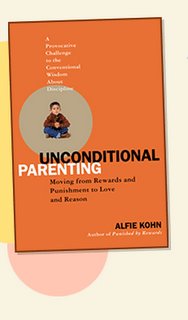Rocky 0.5
The marks on Emilio's face in this photo are just scratches due to long finger nails (our fault) and not from his first fight. However, to get ready for what might come, I've started reading a very interesting and controvertial book titled Unconditional Parenting: Moving from Rewards and Punishement to Reason and Love, by Alfie Kohn. It was recommended to me by Laura, a teacher from my school.
He argues that what children need is unconditional love, not a system of punishment and rewards (positive reinforcement) that implies that kids are loved for what they do (when they please us) and not for what they are. He calls that "conditional parenting."
 The most interesting thing for me is that he believes that positive reinforcement, such as material (candy, toys) or verbal rewards (“good job” or “I really liked how quickly you dressed up for school this morning”) are simply forms of control (he calls it “exploit their dependence for our own convenience”). According to him, parents want their children to comply with their requests so they use praise to make children do what they want, often not really considering what the child needs.
The most interesting thing for me is that he believes that positive reinforcement, such as material (candy, toys) or verbal rewards (“good job” or “I really liked how quickly you dressed up for school this morning”) are simply forms of control (he calls it “exploit their dependence for our own convenience”). According to him, parents want their children to comply with their requests so they use praise to make children do what they want, often not really considering what the child needs.
He also believes that constant verbal praise can:
· Turn to background noise for some children (I actually have seen this in the classroom with those students we call “good.” They do what they are supposed to do and don’t respond to or need praise. I have also seen something else he mentions in the book: students whose parents have high expectations academically and are constantly pushed to perform “well” are the ones most afraid of failing and have trouble tackling challenging and new tasks I offer to them)
· Make children “addicted” to it, so the motivation to “be good” is extrinsic instead of intrinsic and they are always worried about pleasing their parents. He thinks that children feel that they are loved if they are successful or if they perform well . This point is interesting: he thinks most parents will deny this, saying that their children feel loved because you tell them that you love them always but he believes children are smart enough to see how happy the parents are when they do something good and they will want to repeat that behavior. Now, we all know that’s a good outcome but Kohn argues that we need to talk and get to know our kids and encourage them to do the things they want to do not the things we want then to do.
Kohn argues that this kind of reward system develops a type of self-esteem that is too contingent: “I feel good about myself only when… “
I love his style of writing, which is honest and humble but also full of scientific data (and references). He is a parent himself and shares personal stories.
I was amazed how much this theory resonated with me. I always cringe when I see parents pushing their kids to perform for others. I always think they are doing it more for themselves than for the kid. I’m not sure what kind of mother I’ll become but I do know I don’t want Emilio’s happiness and self-esteem to depend on what I think of him. I want him to feel loved and respected no matter what he does.
I’m not sure what kind of mother I’ll become but I do know I don’t want Emilio’s happiness and self-esteem to depend on what I think of him. I want him to feel loved and respected no matter what he does.
For years now I’ve been trying to avoid material rewards in the classroom and I’m starting to see the negative effects of too much praise. It disturbs me to see how much my students depend on my opinion to feel good about themselves.
I’ve only read the first two chapters of Kohn's book but I get the feeling the rest will be as controversial and interesting.
It’s already provoking some great conversations between Steve and me. And we also had a great conversation about it with Jack and Julie.


3 Comments:
Kohn's line of thinking reminds me of Alice Miller's in The Drama of the Gifted Child--which I liked. I look forward to reading this book when you finish it.
I have done alot of work with parents and kids who have troubled relationships. I often say to parents that disciplining your children should not consist of only punishing your children, but rather parenting your children. By this i mean, teaching your kids about boundaries and limits and "appropriate" behavior and decision-making and choices, etc should not be a strictly reactive activity (i.e.--you made a good choice--i react by giving you praise, you made a bad choice--i react by giving you punishment). Rather, parenting is a pro-active job. Talking with your kids about choices, decisions, behaviors, boundaries, prior to having to negotiate them seems to lend itself to much better relationships between parents and kids and also seems to be an activity sorely absent in most of the relationships that I have observed.
I always feel a bit like a fake for saying this type of stuff without having gone through it myself. there's all kinds of literature out there that says that you don't have to be a parent in order to recognize good parenting. it's hard to believe it though.
I really want to read this book. Kohn sounds as if he really has some good ideas. I'm adding it to my "books to read" list. Thanks for the clear and thought-provoking analysis.
Post a Comment
<< Home